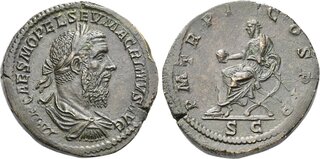Lot description:
The Geoffrey Cope Collection of Ancient Greek and Roman Bronzes. The Roman Empire. Macrinus, 217 – 218.
Description
Sestertius, Roma 217, Æ 31 mm, 24.24 g. IMP CAES M OPEL SEV MACRINVS AVG Laureate, draped and cuirassed bust r., with older features. Rev. P M TR P II COS P P P Macrinus seated l. on curule chair, holding globe and short sceptre.
Reference
C 52
BMC 124
RIC 148
Condition
Very rare and in exceptional condition for the issue, undoubtedly one of the finest sestertii of Macrinus in private hands. A portrait of excellent style, the work of a talented engraver, and a lovely reverse die. Superb dark brown tone, minor traces of double striking on reverse, otherwise good extremely fine
Provenance
M&M sale XXVIII, 1964, 419
Leu sale 33, 1983, 107
CNG–NAC sale 40, 1996, 1596
From the James Fox collection.
Note:
Macrinus, who was of Berber origin, was Rome's first emperor of equestrian background and was Rome's only emperor to hail from Mauretania. He was a prominent jurist and bureaucrat, such that when Caracalla ascended the throne upon the death of Septimius Severus he made Macrinus his praetorian prefect. As commander of the imperial bodyguard, Macrinus was with the emperor in the East during Caracalla's preparations for his planned invasion of Parthia, and it was at Macrinus' instigation that Caracalla was assassinated by one of his own soldiers, Justin Martialis After Caracalla's murder, Macrinus proclaimed himself emperor, assuming the titles and powers that came with the position of supreme leadership without awaiting confirmation from the Senate in Rome. This along with his less than noble origins (all previous emperors had hailed from the senatorial class) did not especially endear him to the Roman Senate. Furthermore, unlike his predecessor, Macrinus was more circumspect with the imperial finances. Where Caracalla had increased the soldiers' yearly pay from 2000 to 3000 sestertii, Macrinus decreed that any newly recruited soldiers would receive the salary that had existed before the increase. This is understandable given the dire situation of the State's finances, and was an absolute necessity given that Caracalla's expensive military campaigns had all but depleted the state's coffers. The veteran soldiers, however, saw this as the precursor to their own eventual reduction in pay and privileges, and when the opportunity presented they revolted. That opportunity came because Macrinus had made the mistake of freeing the extended family of Caracalla, allowing them to return to their hometown of Emesa. Still based at Antioch – Macrinus never had the opportunity to visit Rome after becoming emperor – his safety became jeopardised when the scheming aunt of Caracalla, Julia Maesa, used her vast wealth to secure the allegiance of the soldiers or the legio III Gallica, who were stationed at nearby Raphanea. They proclaimed Maesa's 14 year-old grandson, Elagabal, emperor, and the boy's tutor led the troops to engage Macrinus who fled the field of battle and was soon captured and executed.
Estimate: 25000 CHF |  |